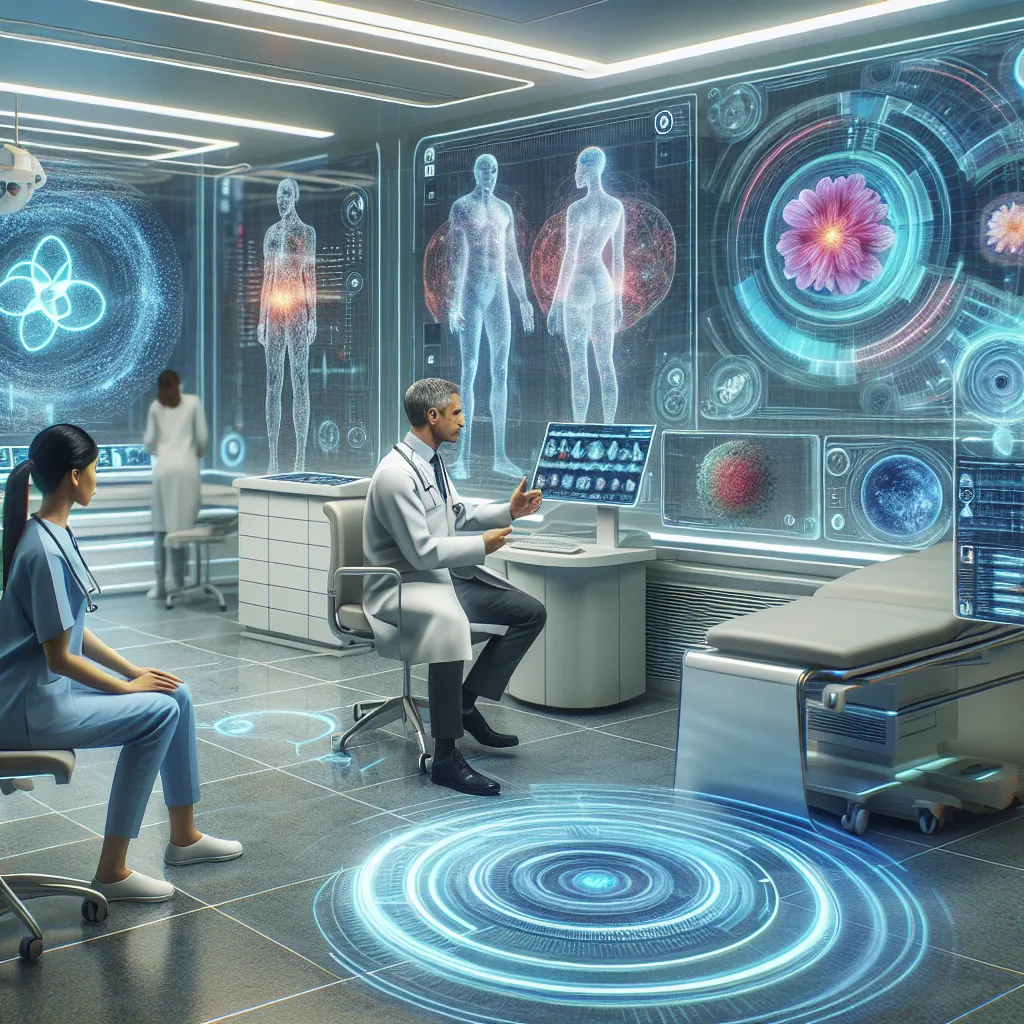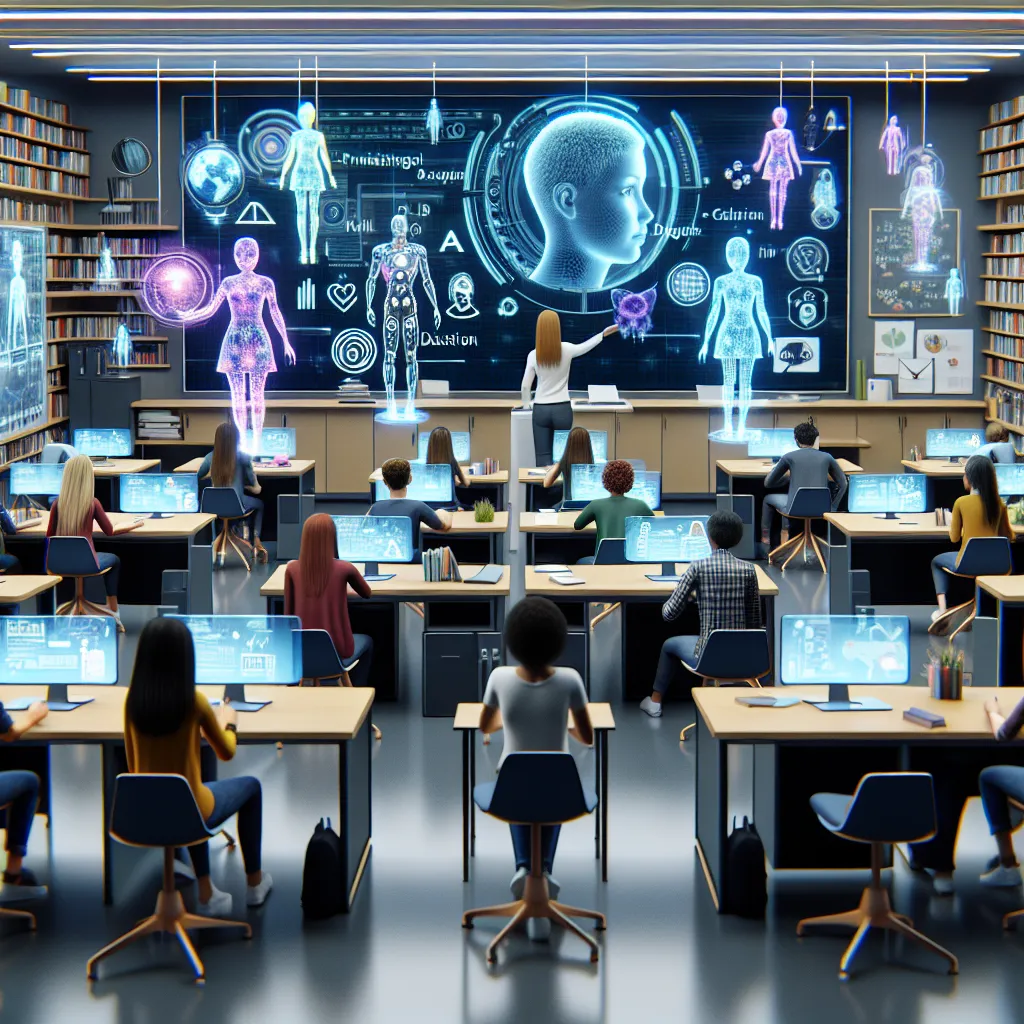Welcome to our comprehensive IELTS Reading practice session focused on “The Role of AI in Personalizing Healthcare.” As an experienced IELTS instructor, I’m here to guide you through a full-length IELTS Reading test, complete with passages, questions, and answers. This practice will help you understand how AI is revolutionizing healthcare while honing your reading skills for the IELTS exam.
Nội dung bài viết
- Introduction to the IELTS Reading Test
- Passage 1 (Easy Text): The Basics of AI in Healthcare
- Questions 1-5: Multiple Choice
- Questions 6-10: Identifying Information (True/False/Not Given)
- Passage 2 (Medium Text): AI-Driven Innovations in Patient Care
- Questions 11-15: Matching Headings
- Questions 16-20: Summary Completion
- Passage 3 (Hard Text): The Ethical Implications of AI in Personalized Healthcare
- Questions 21-26: Matching Information
- Questions 27-30: Sentence Completion
- Questions 31-35: Yes/No/Not Given
- Answer Key
- Passage 1:
- Passage 2:
- Passage 3:
- Conclusion
 AI in personalized healthcare
AI in personalized healthcare
Introduction to the IELTS Reading Test
The IELTS Reading test consists of three passages of increasing difficulty, followed by a series of questions. Today’s practice focuses on the theme of AI in healthcare, a topic that’s becoming increasingly relevant in our technologically advancing world. Let’s dive into the passages and questions, simulating a real IELTS Reading test experience.
Passage 1 (Easy Text): The Basics of AI in Healthcare
Artificial Intelligence (AI) is revolutionizing numerous sectors, and healthcare is no exception. The integration of AI into medical practices is paving the way for more personalized and efficient healthcare services. AI systems can analyze vast amounts of medical data, including patient histories, genetic information, and current health status, to provide tailored treatment plans and predictive healthcare insights.
One of the primary applications of AI in healthcare is in diagnostic accuracy. Machine learning algorithms can process medical images, such as X-rays and MRIs, with remarkable precision, often surpassing human capabilities in detecting anomalies. This not only speeds up the diagnostic process but also reduces the likelihood of misdiagnosis, leading to more timely and appropriate treatments.
Moreover, AI is proving invaluable in drug discovery and development. By analyzing molecular structures and predicting how different compounds might interact with various diseases, AI can significantly expedite the process of identifying potential new medications. This capability is particularly crucial in responding to emerging health crises, as demonstrated during the recent global pandemic.
Personalized medicine is another area where AI is making significant strides. By analyzing a patient’s genetic makeup, lifestyle factors, and medical history, AI systems can recommend tailored treatment plans that are more likely to be effective for that individual. This approach moves away from the traditional one-size-fits-all model of healthcare, potentially improving patient outcomes and reducing adverse reactions to treatments.
However, the implementation of AI in healthcare is not without challenges. Issues of data privacy, ethical considerations, and the need for human oversight remain crucial topics of discussion. As AI continues to evolve, finding the right balance between technological advancement and ethical responsibility will be key to harnessing its full potential in healthcare.
Questions 1-5: Multiple Choice
Choose the correct letter, A, B, C, or D.
-
According to the passage, AI in healthcare is primarily used for:
A) Replacing human doctors
B) Analyzing large amounts of medical data
C) Performing surgeries
D) Managing hospital administration -
The passage suggests that AI can improve diagnostic accuracy by:
A) Replacing all human diagnosticians
B) Processing medical images more quickly than humans
C) Eliminating the need for medical imaging
D) Conducting physical examinations of patients -
In drug discovery, AI is valuable because it can:
A) Manufacture new drugs
B) Test drugs on virtual patients
C) Analyze molecular structures to predict interactions
D) Replace clinical trials entirely -
Personalized medicine using AI involves:
A) Creating unique medications for each patient
B) Analyzing genetic makeup and lifestyle factors
C) Eliminating the need for doctors
D) Providing one-on-one nursing care -
The passage indicates that challenges in implementing AI in healthcare include:
A) The high cost of AI systems
B) Lack of interest from medical professionals
C) Data privacy and ethical considerations
D) AI’s inability to understand human emotions
Questions 6-10: Identifying Information (True/False/Not Given)
Do the following statements agree with the information given in the passage?
Write:
TRUE if the statement agrees with the information
FALSE if the statement contradicts the information
NOT GIVEN if there is no information on this
- AI can analyze patient histories and genetic information to provide personalized healthcare.
- Machine learning algorithms are less accurate than human doctors in analyzing medical images.
- AI has been used successfully in responding to recent global health crises.
- The traditional healthcare model is more effective than AI-driven personalized medicine.
- There is unanimous agreement on how to implement AI in healthcare ethically.
Passage 2 (Medium Text): AI-Driven Innovations in Patient Care
The integration of Artificial Intelligence (AI) into healthcare systems is ushering in a new era of patient care, characterized by unprecedented levels of personalization and efficiency. This technological revolution is not just enhancing existing medical practices but is also paving the way for entirely new approaches to health management and disease prevention.
One of the most promising applications of AI in healthcare is in the realm of predictive analytics. By leveraging machine learning algorithms to analyze vast datasets encompassing patient histories, genetic profiles, and lifestyle factors, AI systems can identify individuals at high risk of developing specific conditions long before symptoms manifest. This proactive approach allows for early intervention strategies that can significantly improve patient outcomes and potentially prevent the onset of serious illnesses.
Moreover, AI is transforming the way healthcare providers interact with and monitor their patients. Wearable devices equipped with AI capabilities can continuously track vital signs and other health metrics, providing real-time data to both patients and healthcare professionals. These devices can detect subtle changes in a patient’s condition, alerting medical staff to potential problems before they become critical. This constant monitoring extends the reach of healthcare beyond hospital walls, enabling more effective home-based care and reducing the need for frequent hospital visits.
In the field of chronic disease management, AI is proving particularly valuable. For patients with conditions such as diabetes, heart disease, or respiratory disorders, AI-powered systems can analyze daily health data to provide personalized recommendations for medication adjustments, dietary changes, or activity levels. This level of customized care was previously impossible to achieve on a large scale, but AI makes it feasible and cost-effective.
The potential of AI in drug discovery and development is equally transformative. Traditional methods of identifying and testing new drugs are time-consuming and expensive. AI algorithms can rapidly screen millions of chemical compounds, predicting their potential efficacy and safety profiles. This accelerates the drug discovery process, potentially bringing life-saving medications to market faster and at lower cost.
However, the integration of AI into healthcare is not without its challenges. Data privacy concerns are paramount, as AI systems require access to vast amounts of sensitive medical information to function effectively. Ensuring the security and appropriate use of this data is crucial to maintaining public trust in AI-driven healthcare solutions.
Additionally, there is the question of AI interpretability. Many AI systems, particularly those based on deep learning, operate as “black boxes,” making decisions through processes that are not easily understood by humans. In a field as critical as healthcare, where decisions can have life-or-death consequences, the ability to explain and justify AI-generated recommendations is essential.
Despite these challenges, the potential benefits of AI in personalizing healthcare are too significant to ignore. As the technology continues to evolve and these hurdles are addressed, AI is poised to play an increasingly central role in shaping the future of medicine, promising a healthcare system that is more personalized, proactive, and effective than ever before.
Questions 11-15: Matching Headings
Match the following headings to the paragraphs in the passage. Write the correct number (i-viii) next to questions 11-15.
i. The challenge of understanding AI decision-making
ii. AI’s role in early disease detection
iii. Revolutionizing drug development with AI
iv. Continuous health monitoring through AI-enabled devices
v. Ethical concerns in AI healthcare implementation
vi. AI’s impact on managing long-term health conditions
vii. The future landscape of AI in medicine
viii. Traditional vs. AI-driven healthcare approaches
- Paragraph 2: _____
- Paragraph 3: _____
- Paragraph 4: _____
- Paragraph 5: _____
- Paragraph 7: _____
Questions 16-20: Summary Completion
Complete the summary below using words from the box. Write the correct letter (A-L) next to questions 16-20.
A) diagnosis B) proactive C) wearable D) chronic E) interpretability
F) privacy G) reactive H) stationary I) acute J) security
K) prevention L) treatment
AI is transforming healthcare by enabling a more (16) approach to patient care. Through predictive analytics, it can identify health risks before symptoms appear, facilitating early intervention and disease (17). (18) devices with AI capabilities allow for continuous monitoring of patients’ health, extending care beyond hospitals. In managing (19) diseases, AI provides personalized recommendations for medication and lifestyle changes. However, challenges remain, including data (20)_____ concerns and the need for AI systems to explain their decision-making processes.
Passage 3 (Hard Text): The Ethical Implications of AI in Personalized Healthcare
The rapid integration of Artificial Intelligence (AI) into healthcare systems heralds a new era of personalized medicine, promising unprecedented improvements in diagnosis, treatment, and patient outcomes. However, this technological revolution also brings forth a complex array of ethical considerations that must be carefully navigated to ensure that the benefits of AI in healthcare are realized without compromising fundamental ethical principles or exacerbating existing healthcare inequities.
One of the primary ethical concerns surrounding AI in healthcare is the issue of data privacy and consent. AI systems require vast amounts of personal health data to function effectively, raising questions about how this data is collected, stored, and used. The potential for data breaches or misuse of sensitive medical information is a significant concern, particularly given the intimate nature of health data. Moreover, the concept of informed consent becomes more complex in the context of AI-driven healthcare. Patients may not fully understand how their data will be used or the implications of AI-generated insights, challenging traditional notions of patient autonomy and informed decision-making.
Another critical ethical consideration is the potential for bias in AI algorithms. AI systems are only as unbiased as the data they are trained on and the humans who design them. Historical biases in healthcare data, such as underrepresentation of certain demographic groups in clinical trials, can be inadvertently perpetuated and amplified by AI systems. This could lead to disparities in the quality of AI-driven healthcare services available to different populations, potentially exacerbating existing health inequalities rather than alleviating them.
The question of accountability in AI-driven healthcare decisions presents another ethical challenge. When AI systems are involved in critical medical decisions, determining responsibility in cases of errors or adverse outcomes becomes complex. Is it the AI system, the healthcare provider who relied on the AI’s recommendation, or the developers of the AI that should be held accountable? This ambiguity could have significant legal and ethical implications, potentially affecting patient trust in AI-driven healthcare solutions.
Furthermore, the integration of AI into healthcare raises questions about the changing nature of the doctor-patient relationship. While AI can provide valuable insights and support to healthcare providers, there is a risk that over-reliance on technology could lead to a depersonalization of healthcare. The human elements of empathy, intuition, and holistic understanding that are crucial in healthcare could be diminished if AI systems are not carefully integrated to complement rather than replace human interaction.
The digital divide presents another ethical concern in the context of AI-driven personalized healthcare. Access to AI-enhanced healthcare services may be limited by factors such as technological literacy, internet connectivity, and economic resources. This could create or widen gaps in healthcare quality and outcomes between different socioeconomic groups, potentially violating principles of justice and equity in healthcare provision.
Additionally, the use of AI in predictive healthcare raises ethical questions about how to handle information regarding future health risks. If AI systems can predict a high likelihood of developing a serious condition in the future, how should this information be communicated to patients? There are complex ethical considerations surrounding the psychological impact of such predictions and how they might influence an individual’s life choices and insurance options.
As AI continues to advance, the ethical landscape of healthcare will undoubtedly evolve. It is crucial that the development and implementation of AI in healthcare be guided by robust ethical frameworks that prioritize patient welfare, equity, and human rights. This may require new regulatory approaches, enhanced education for healthcare providers and patients about AI, and ongoing dialogue between technologists, healthcare professionals, ethicists, and policymakers.
In conclusion, while AI holds immense potential to revolutionize and personalize healthcare, its ethical implications are profound and multifaceted. Addressing these ethical challenges is not merely a prerequisite for the responsible development of AI in healthcare but an ongoing process that must evolve in tandem with technological advancements. Only by carefully navigating these ethical considerations can we ensure that the integration of AI into healthcare systems truly serves to enhance human health and well-being in an equitable and ethically sound manner.
Questions 21-26: Matching Information
Match the following statements (A-H) with the correct paragraph (21-26) in the passage. Write the correct letter (A-H) next to questions 21-26. You may use any letter more than once.
A) Discusses how AI might affect the personal aspect of medical care
B) Mentions the challenge of determining who is responsible for AI-related medical errors
C) Explains how AI could potentially worsen existing healthcare inequalities
D) Addresses the ethical concerns related to predicting future health conditions
E) Highlights the need for new regulatory approaches in AI healthcare
F) Discusses the complexities of obtaining informed consent for AI-driven healthcare
G) Explains how AI could change the traditional doctor-patient relationship
H) Addresses the issue of unequal access to AI-enhanced healthcare services
- Paragraph 2: _____
- Paragraph 3: _____
- Paragraph 4: _____
- Paragraph 5: _____
- Paragraph 6: _____
- Paragraph 7: _____
Questions 27-30: Sentence Completion
Complete the sentences below using NO MORE THAN TWO WORDS from the passage for each answer.
-
The collection and use of vast amounts of personal health data by AI systems raise concerns about data __ and consent.
-
Historical biases in healthcare data can be __ and amplified by AI systems, potentially leading to healthcare disparities.
-
Over-reliance on AI in healthcare could lead to a __ of healthcare, diminishing important human elements like empathy.
-
The development and implementation of AI in healthcare should be guided by robust __ that prioritize patient welfare and equity.
Questions 31-35: Yes/No/Not Given
Do the following statements agree with the claims of the writer in the passage?
Write:
YES if the statement agrees with the claims of the writer
NO if the statement contradicts the claims of the writer
NOT GIVEN if it is impossible to say what the writer thinks about this
- AI in healthcare will completely eliminate the need for human doctors in the future.
- The issue of data privacy is the most significant ethical concern in AI-driven healthcare.
- AI systems in healthcare are currently free from any form of bias.
- The integration of AI in healthcare requires ongoing dialogue between various stakeholders.
- Ethical considerations in AI healthcare are a one-time issue that can be resolved quickly.
Answer Key
Passage 1:
- B
- B
- C
- B
- C
- TRUE
- FALSE
- TRUE
- FALSE
- NOT GIVEN
Passage 2:
- ii
- iv
- vi
- iii
- i
- B
- K
- C
- D
- F
Passage 3:
- F
- C
- B
- A
- H
- D
- privacy
- perpetuated
- depersonalization
- ethical frameworks
- NOT GIVEN
- NOT GIVEN
- NO
- YES
- NO
Conclusion
This IELTS Reading practice test on “The Role of AI in Personalizing Healthcare” has provided you with a comprehensive exploration of this cutting-edge topic while honing your reading skills. Remember to analyze your performance, noting areas where you excelled and those that need improvement. Regular practice with diverse topics will help you build the skills and confidence needed for success in the IELTS Reading test.
For more IELTS practice and insights, check out our related articles on the rise of AI in personalized healthcare and how AI is transforming global healthcare systems. These resources will further enhance your understanding of this important topic and support your IELTS preparation journey.


